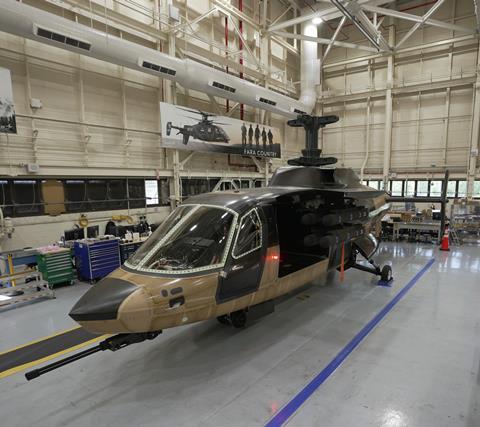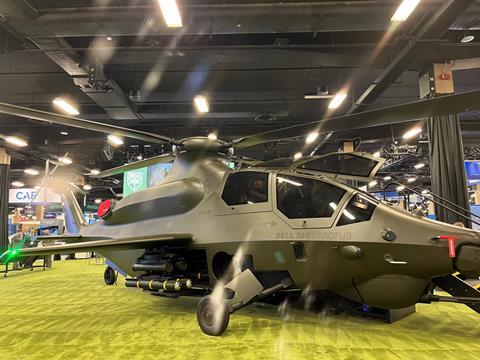Impact to the rotary aviation industrial base will not be a factor in the US Army’s choice for its next-generation scout helicopter.
That is the word from the service’s top aviation procurement officer, Major General Robert Barrie, who spoke at the Army Aviation Association of America (AAAA) conference in Nashville, Tennessee on 27 April.

“That would not be a factor,” Barrie says when asked if the army would consider the financial impact to a particular manufacturer in the strategic industry. “In any source selection process, that would not explicitly be a factor,” he adds.
Two manufacturers – Bell and Sikorsky – are competing to produce the army’s Future Attack Reconnaissance Aircraft (FARA) that is planned to replace the retired Bell OH-58 Kiowa scout aircraft.
The same two companies competed to supply the Future Long Range Assault Aircraft (FLRAA), the next-generation troop carrier meant to succeed Sikorsky’s UH-60 Black Hawk. The army in December 2022 chose Bell for the multi-decade FLRAA programme – a deal estimated to be worth as much as $70 billion.
Simultaneously, the army is also preparing to wind down its purchases of the UH-60, although those could continue into 2033.
Although the company has other lines of business, the double hit to Sikorsky’s army programmes has led to speculation among industry observers that the army may consider the financial health of the strategically important company when evaluating Sikorsky’s FARA bid.
Defence manufacturers regularly note that without consistent orders, they cannot maintain the skilled workforce and complex machinery needed in modern aerospace production. Members of Congress representing Connecticut-headquartered Sikorsky were early critics of the army’s decision process for the FLRAA award. The company is a major employer and source of revenue for the small state.
However, based on Barrie’s comments at the AAAA event, such a concern will not factor into the ultimate FARA decision, which is not expected for at least several years.

Government procurement rules require selections to be unbiased and based purely on the criteria established in requests for proposals, according to legal consulting firm UpCounsel. Additionally, the firm says, “all bidders must be treated fairly and judged on an equal basis”.
The independent Government Accountability Office (GAO) ultimately upheld the army’s evaluation criteria and selection of Bell’s V-280 tiltrotor for FLRAA, despite a challenge by Sikorsky parent-company Lockheed Martin.
The army’s FLRAA evaluation criteria included flight performance, cost and design traits such as inclusion of open-source architecture hardware. According to the GAO review, the army acceptably weighted performance and design architecture considerations as more important than price.
Such guidelines were established in the army’s request for proposal, which outlined the service’s requirements for FLRAA designs and how submissions would be evaluated.
Deviations from published standards can be grounds for the GAO to overturn selections – a fact sure to draw scrutiny in the FARA process if factors beyond the official bid presentation were to be considered.
Barrie notes that neither the FARA nor FLRAA programmes have reached the official “programme of record” status, under which a piece of equipment or service is being actively purchased by the Pentagon.
“In all cases for the [Future Vertical Lift] portfolio, we have not yet entered programmes of record,” he says.
With the selection of Bell as equipment provider, FLRAA is progressing toward that milestone. The company and the army must first agree on final aircraft design specifications and contract terms.
FARA is still several years earlier in the process, with Sikorsky and Bell yet to begin flight testing. The manufacturers are waiting on GE Aerospace to provide the army-mandated engines for the two prototype aircraft. GE’s delivery of the powerplants has been repeatedly delayed.
The army expects flight testing to begin sometime in 2024. Service leaders say the programme retains strong support in the Pentagon and from lawmakers on Capitol Hill.
“We are committed to the [FARA] programme,” says outgoing army chief of staff and pilot General James McConville. “We need it.”


























